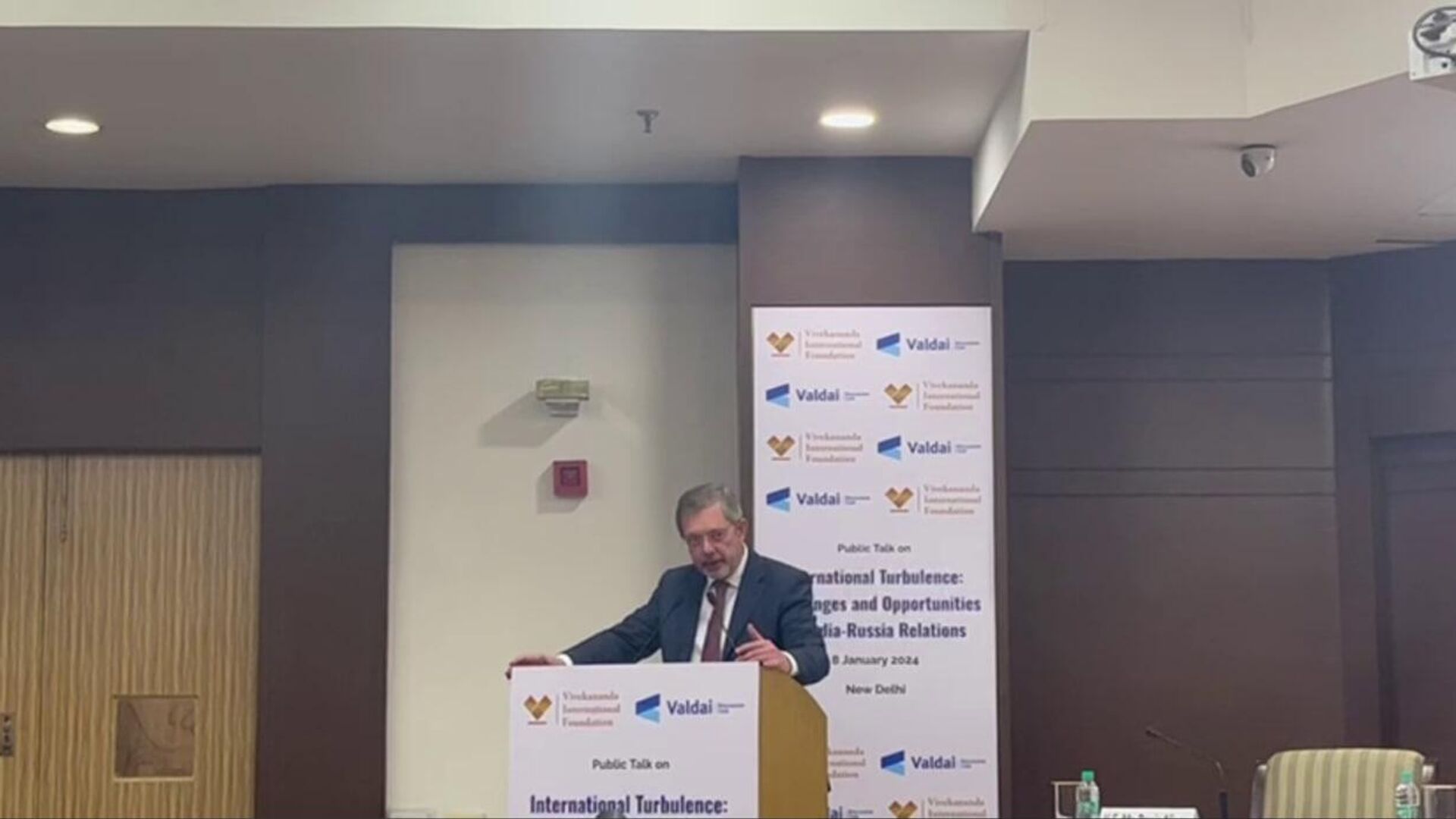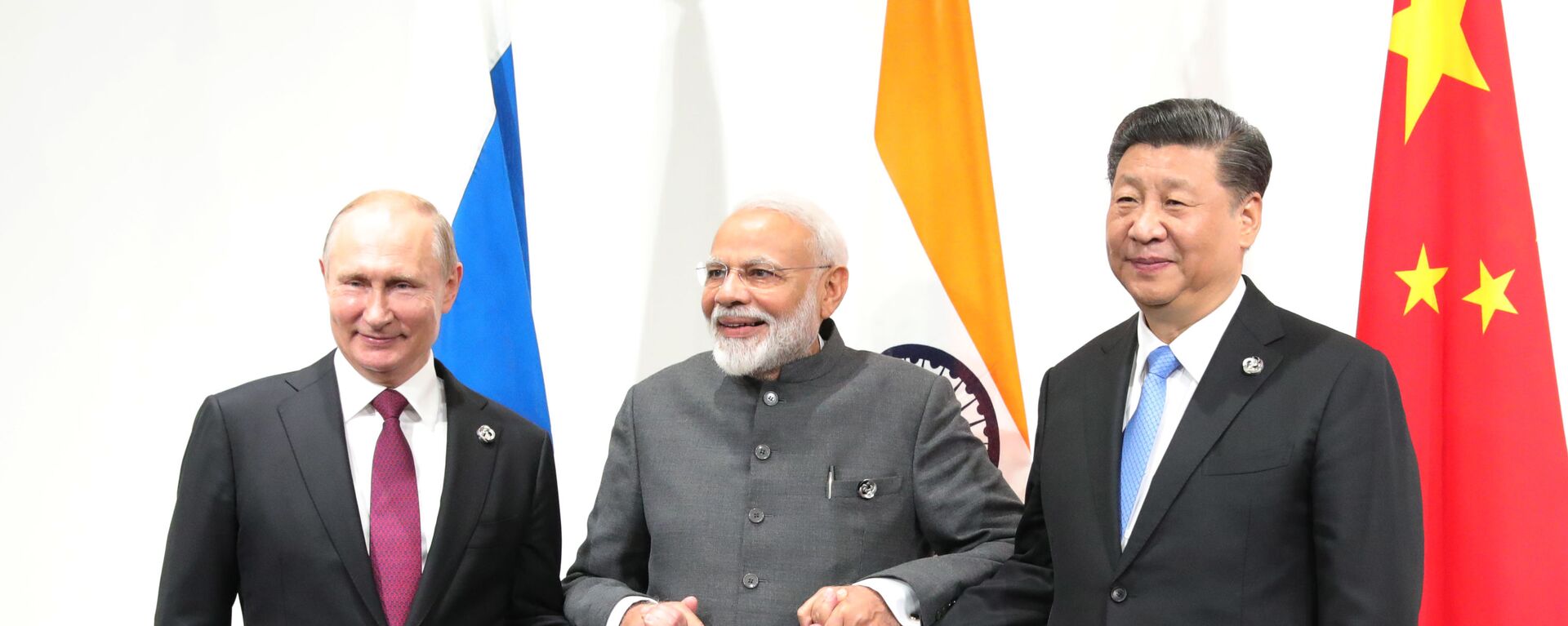https://sputniknews.in/20240109/russia-will-try-to-decrease-india-china-tensions-valdai-expert-says-6136000.html
Russia Will Try to Decrease India-China Tensions, Valdai Expert Says
Russia Will Try to Decrease India-China Tensions, Valdai Expert Says
Sputnik India
New Delhi has said that ties with Beijing have been in an “abnormal state” since the Galwan Valley clashes in June 2020, which led to deaths of 20 Indian and five Chinese troops.
2024-01-09T15:26+0530
2024-01-09T15:26+0530
2024-01-09T15:34+0530
indo-russian relations
india
russia
china
shanghai cooperation organisation (sco)
brics
ajit doval
valdai discussion club
moscow
people's liberation army (pla)
https://cdn1.img.sputniknews.in/img/07e8/01/09/6137441_5:0:1251:701_1920x0_80_0_0_c67e9bc97274030c64b54d1a946f81e3.jpg
Strained ties between India and China due to the Ladakh border dispute remain a “significant problem” for Russia and Moscow would try its best to “decrease tensions”, a Russian expert has told Sputnik India on the sidelines of the ‘first Valdai Club Russia-India conference' in New Delhi on Monday.The Track II diplomacy event was jointly organised and hosted by New Delhi-based think tank Vivekananda International Foundation (VIF).A brainchild of Primakov, the Russia-India-China (RIC) mechanism was formed to forge greater trilateral coordination on major global issues. The last leadership-level meeting of the RIC took place in Buenos Aires in 2018.Moscow has expressed confidence that the RIC could act as a forum for “promotion of a constructive dialogue” between the two Asian neighbours.“It (interactions in SCO and BRICS) is not a replacement for bilateral relations which need to be reinvented. But, at least, it helps in forging some cooperation,” the Valdai Club expert said.He asserted that Sino-India bilateral tensions weren’t an “obstacle” in the three countries’ mutual objective of a “multipolar world order”.Thousands of troops from India and China have been locked in a standoff at several friction points in the eastern Ladakh region. Both the armies have managed to de-escalate the situation and disengage troops from other friction points as a result of rounds of military commander-level and official consultations.Both India and China have maintained that they would like to resolve the border dispute bilaterally through talks.India Welcomes Russia’s Greater Role in Asia-PacificHowever, Lukyanov said that Moscow’s current involvement in the Ukraine crisis posed a “problem” as far as increasing its presence in the Indian and Pacific Oceans was concerned.Discussions with Indian Experts, OfficialsLukyanov, part of the Russian expert delegation attending the first Valdai Club Russia-India conference, took part in closed-door and public interactions with Indian delegates on Monday.The restricted sessions discussed ongoing trends transforming the post World War II order as well as India-Russia bilateral cooperation in the emerging geopolitical realities.The public session, titled ‘International Turbulence: Challenges and Opportunities for India-Russia Relations’, witnessed the experts giving a sense of their discussions and ways to expand India-Russia bilateral and multilateral cooperation.At the conclusion of the meeting, the Russian experts met members of India’s National Security Advisory Board (NSAB), which is chaired by National Security Advisor Ajit Doval.
https://sputniknews.in/20231228/jaishankars-visit-to-moscow-russia-india-china-global-cooperation-is-here-to-stay-6004076.html
india
russia
china
moscow
ladakh
galwan valley
sino-indian border
Sputnik India
feedback.hindi@sputniknews.com
+74956456601
MIA „Rossiya Segodnya“
2024
Dhairya Maheshwari
https://cdn1.img.sputniknews.in/img/07e6/0c/13/138962_0:0:641:640_100x100_80_0_0_2cb44360dbcdf6d84bf4b299cd045917.jpg
Dhairya Maheshwari
https://cdn1.img.sputniknews.in/img/07e6/0c/13/138962_0:0:641:640_100x100_80_0_0_2cb44360dbcdf6d84bf4b299cd045917.jpg
News
en_IN
Sputnik India
feedback.hindi@sputniknews.com
+74956456601
MIA „Rossiya Segodnya“
Sputnik India
feedback.hindi@sputniknews.com
+74956456601
MIA „Rossiya Segodnya“
Dhairya Maheshwari
https://cdn1.img.sputniknews.in/img/07e6/0c/13/138962_0:0:641:640_100x100_80_0_0_2cb44360dbcdf6d84bf4b299cd045917.jpg
russia india, russia india trade, russia india relations, russia india news, russia india china, russia india china ric, russian oil exports, russian oil exports to india, india china news, india china, india china trade, india china war, india china border, galwan valley clashes, valdai club, valdai discussion club, valdai club members, valdai vif conference
russia india, russia india trade, russia india relations, russia india news, russia india china, russia india china ric, russian oil exports, russian oil exports to india, india china news, india china, india china trade, india china war, india china border, galwan valley clashes, valdai club, valdai discussion club, valdai club members, valdai vif conference
Russia Will Try to Decrease India-China Tensions, Valdai Expert Says
15:26 09.01.2024 (Updated: 15:34 09.01.2024) New Delhi has said that ties with Beijing have been in an “abnormal state” since the Galwan Valley clashes in June 2020, which led to deaths of 20 Indian and five Chinese troops.
Strained ties between India and China due to the Ladakh border dispute remain a “significant problem” for Russia and Moscow would try its best to “decrease tensions”, a Russian expert has told Sputnik India on the sidelines of the ‘first Valdai Club Russia-India conference' in New Delhi on Monday.
The
Track II diplomacy event was jointly organised and hosted by New Delhi-based think tank
Vivekananda International Foundation (VIF).“The controversy between India and China is a significant problem for Russia as Moscow needs close cooperation with both countries. Trilateral format as proposed many years ago by the late (Russian Prime Minister) Yevgeni Primakov doesn't work well under circumstances, but multilateral arrangements suit them better,” stated Fyodor Lukyanov, the Research Director of the Foundation for Development and Support of the Valdai Discussion Club.
A brainchild of Primakov, the Russia-India-China (RIC) mechanism was formed to forge greater trilateral coordination on major global issues. The last leadership-level meeting of the RIC took place in Buenos Aires in 2018.
Moscow has expressed confidence that the RIC could act as a forum for “promotion of a constructive dialogue” between the two Asian neighbours.
While Lukyanov raised concerns about trilateral cooperation in the framework of RIC due to the Ladakh dispute, he highlighted that multilateral groupings such as BRICS and the Shanghai Cooperation Organisation (SCO) remained a much better platform for the three Eurasian powers to jointly pursue global issues of “overall interest”.
“It (interactions in SCO and BRICS) is not a replacement for bilateral relations which need to be reinvented. But, at least, it helps in forging some cooperation,” the Valdai Club expert said.
He asserted that Sino-India bilateral tensions weren’t an “obstacle” in the three countries’ mutual objective of a “multipolar world order”.
“The multipolar world order is there, if we see it in terms of an opposition to hegemony. We don’t know yet what exactly this order means. This is a work in progress. But rivalry between poles is an imminent characteristic of such a system, so India-China relations cannot be an obstacle,” explained the geopolitical pundit.
“As far as Russia is concerned, these tensions are a sad thing for us as we need for our purposes very intense relations with both countries. So, Russia will try its best to decrease tensions,” Lukyanov added.
Thousands of troops from India and China have been locked in a standoff at several friction points in the eastern Ladakh region. Both the armies have
managed to de-escalate the situation and disengage troops from other friction points as a result of rounds of military commander-level and official consultations.
Both India and China have maintained that they would like to resolve the border dispute bilaterally through talks.
India Welcomes Russia’s Greater Role in Asia-Pacific
Lukyanov further underscored the point that New Delhi was “very much open” to Russia’s growing role in the emerging security architecture of Asia-Pacific in spite of being part of the US-led Quad grouping.
“Greater Russian presence there poses no risks to India,” he stressed.
However, Lukyanov said that Moscow’s current involvement in the
Ukraine crisis posed a “problem” as far as
increasing its presence in the Indian and
Pacific Oceans was concerned.
“Moscow is now focused on more important priorities in Eastern Europe, and it will not be able to fully dedicate itself to Asia-Pacific until the main priority is tackled,” the Valdai Club expert concluded.
Discussions with Indian Experts, Officials
Lukyanov, part of the Russian expert delegation attending the
first Valdai Club Russia-India conference, took part in closed-door and public interactions with Indian delegates on Monday.
The restricted sessions discussed ongoing trends transforming the post World War II order as well as India-Russia bilateral cooperation in the emerging geopolitical realities.
The public session, titled ‘International Turbulence: Challenges and Opportunities for India-Russia Relations’, witnessed the experts giving a sense of their discussions and ways to expand India-Russia bilateral and multilateral cooperation.
At the conclusion of the meeting, the Russian experts met members of India’s National Security Advisory Board (NSAB), which is chaired by
National Security Advisor Ajit Doval.



